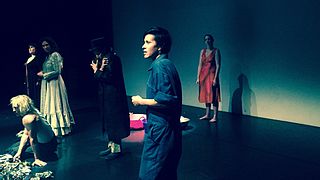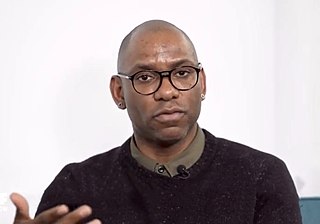Related Research Articles

Urvashi Vaid was an Indian-born American LGBT rights activist, lawyer, and writer. An expert in gender and sexuality law, she was a consultant in attaining specific goals of social justice. She held a series of roles at the National LGBTQ Task Force, serving as executive director from 1989-1992 — the first woman of color to lead a national gay-and-lesbian organization. She is the author of Virtual Equality: The Mainstreaming of Gay and Lesbian Liberation (1995) and Irresistible Revolution: Confronting Race, Class and the Assumptions of LGBT Politics (2012).

Pick Up the Mic is a documentary film, released in 2006, which profiles the underground homo hop scene, which is a subgenre of hip hop that includes gay, lesbian, bisexual and transgender artists. The film was directed by Alex Hinton.
The PeaceOUT (World) Homo Hop Festival was an annual festival of hip hop music and culture created by Lesbian, Gay, Bisexual, and Transgender (LGBT) people from 2001 to 2007. The main festival took place in Oakland, California, although sibling festivals were also held in New York City, Atlanta and London.
Deep Dickollective (D/DC) was an LGBT hip hop group based in Oakland, California that were active in the homo hop scene of openly queer/LGBT artists during the 2000s. They were regular performers at the PeaceOUT World Homo Hop Festival curated by group co-founder Juba Kalamka.
Juba Kalamka is an African American bisexual artist and activist recognized for his work and founding member of homohop group Deep Dickollective (D/DC) and his development of the micro-label sugartruck recordings.
QBoy is a UK-based rapper, producer, DJ, writer and presenter. He is one of the original few out rappers in hip hop circa 2001 that became pioneers of the new subgenre colloquially known as "homo hop". QBoy is currently a DJ and promoter of popular LGBTQ club night and party 'R & She: The Queens of Hip-Hop & R&B' which hosts events in London, Berlin and New York City.
Banjee is a term from ball culture describing a person embodying an urban, tough swagger. The term is mostly associated with New York City and may be Nuyorican in origin. Attitude, clothing, ethnicity, masculinity, physique, and youth are all elements of what has been called "banjee realness".

Homotopia is a 2007 short film by Eric A. Stanley and Chris E. Vargas. The film talks about the politics of gay marriage and assimilation and highlights racism, colonialism, HIV/AIDS, and the State.

Anye Elite is an American singer, rapper and LGBT activist. He is best known for his contributions to Atlanta's gay community.
LGBT representation in hip hop music have existed since the birth of the genre even while enduring blatant discrimination. Due to its adjacency to disco, the earliest days of hip hop had a close relation to LGBT subcultures, and multiple LGBT DJs have played a role in popularizing hip hop. Despite this early involvement, hip hop has long been portrayed as one of the least LGBT-friendly genres of music, with a significant body of the genre containing homophobic views and anti-gay lyrics, with mainstream artists such as Eminem and Tyler, the Creator having used casual homophobia in their lyrics, including usages of the word faggot. Attitudes towards homosexuality in hip hop culture have historically been negative, with slang that uses homosexuality as a punchline such as "sus", "no homo", and "pause" being heard in hip hop lyrics from some of the industry's biggest artists. Since the early 2000s there has been a flourishing community of LGBTQ+ hip hop artists, activists, and performers breaking barriers in the mainstream music industry.

Rocco Kayiatos, known professionally as Katastrophe and in some later releases as Rocco Katastrophe, is an American rapper.
Lesbian, gay, bisexual, transgender, and queer+(LGBTQ+)music is music that focuses on the experiences of gender and sexual minorities as a product of the broad gay liberation movement.
Homophobia in ethnic minority communities is any negative prejudice or form of discrimination in ethnic minority communities worldwide towards people who identify as–or are perceived as being–lesbian, gay, bisexual or transgender (LGBT), known as homophobia. This may be expressed as antipathy, contempt, prejudice, aversion, hatred, irrational fear, and is sometimes related to religious beliefs. A 2006 study by the Joseph Rowntree Foundation in the UK found that while religion can have a positive function in many LGB Black and Minority Ethnic (BME) communities, it can also play a role in supporting homophobia.

The African-American LGBT community, otherwise referred to as the Black American LGBT community, is part of the overall LGBTQ culture and overall African-American culture. The initialism LGBT stands for lesbian, gay, bisexual, and transgender.
Austin, Texas, has one of the most prominent and active LGBT populations in the United States. Austin was acclaimed by The Advocate in 2012 as part of its Gayest Cities in America, and was recognized by Travel and Leisure as one of America's Best Cities for Gay Travel. Much of Austin's gay nightlife scene is clustered around 4th Street. LGBT activism groups Atticus Circle and Equality Texas are headquartered in Austin.
Jaime Cortez is a Chicano-American graphic novelist, visual artist, writer, teacher, and performer. Cortez is also known for his role as an LGBT rights activist, and HIV/AIDS prevention work.
In the United States, LGBT youth of colour are marginalized adolescents in the LGBT community. Social issues include homelessness; cyberbullying; physical, verbal and sexual abuse; suicide; drug addiction; street violence; immigration surveillance; engagement in high-risk sexual activity; self-harm, and depression. The rights of LGBT youth of colour are reportedly not addressed in discussions of sexuality and race in the larger context of LGBT rights.

The Highways Performance Space is a performance venue in Santa Monica, California, which focuses on new works and alternative pieces. The organization is a space for LGBTQ artists to experiment with form and content. Performed work includes theatre, music, dance, spoken word, interactive media, and visual arts.

Kenyon Farrow is an American writer, activist, director, and educator focused on progressive racial and economic justice issues related to the LGBTQ community. He served as the executive director of Queers for Economic Justice, policy institute fellow with National LGBTQ Task Force, U.S. & Global Health Policy Director of Treatment Action Group, public education and communications coordinator for the New York State Black Gay Network, senior editor with TheBody.com and TheBodyPro.com, and co-executive director of Partners for Dignity and Rights. In 2021, Farrow joined PrEP4All as managing director of advocacy & organizing.
Queer art, also known as LGBT+ art or queer aesthetics, broadly refers to modern and contemporary visual art practices that draw on lesbian, gay, bisexual, transgender, and various non-heterosexual, non-cisgender imagery and issues. While by definition there can be no singular "queer art", contemporary artists who identify their practices as queer often call upon "utopian and dystopian alternatives to the ordinary, adopt outlaw stances, embrace criminality and opacity, and forge unprecedented kinships and relationships." Queer art is also occasionally very much about sex and the embracing of unauthorised desires.
References
- 1 2 3 4 5 Wilson, D. Mark. "Post-pomo hip-hop homos: hip-hop art, gay rappers, and social change." Social Justice 34.1 (107 (2007): 117-140.
- 1 2 Penney, Joel. ""We Don't Wear Tight Clothes": Gay Panic and Queer Style in Contemporary Hip Hop." Popular Music and Society 35.3 (2012): 321-332.
- 1 2 Fleetwood, Nicole Rachelle. Documenting" the Real": youth, race, and the discourse of realness in visual culture. Stanford University, 2001.
- 1 2 Flores, Maria Ruth A. Knowledge Morena and Literacies de Colores: Toward the Embodiment of Life Giving Knowledges in the Arts, Poetry and Song. ProQuest, 2006.
- 1 2 Bailey, Marlon M. "Performance as Intravention." Black Genders and Sexualities: 211.
- 1 2 Accomando, Christina. "Social Justice, Action, and Teaching: The Legacies of Eric Rofes." Issue 34-Social Justice Action, Teaching, and Research: 9.
- 1 2 Tim'm West: Reading & Q&A
- ↑ Doug Cooper-Spencer: The View From Here: Tim’m West, Hip Hop Renaissance Man
- ↑ one of 31 LGBT Icons by LGBT History Month.PrideIndex.com
- ↑ stutter
- 1 2 3 4 5 6 7 8 9 10 11 12 13 "The Deliberate Revolutionary," Washington Blade, April 29, 2005. (archive at )
- 1 2 3 4 The One Loved Best, An Interview with Tim’M West | Prideindex
- 1 2 3 4 One-on-One With Tim'm West - TheBody.com
- 1 2 3 4 5 Tim'm West: Rhymes with homo side | Music Feature | Creative Loafing Atlanta
- ↑ NewBlackMan (in Exile): DeepDickollective Co-Founder Tim'm West on Frank Ocean
- 1 2 3 4 5 6 7 Tim'm West and the masculine mystique: In his career as a hip-hop artist—and now through his work at the Center on Halsted—West has demonstrated that there's more than one way to be a black gay man.
- ↑ Tim’m West speaks at UTD and then Queerly Speaking | Dallas Voice
- 1 2 "Homo Hop is dead, Queer hip hop is the real deal". Archived from the original on 2013-03-17. Retrieved 2014-01-04.
- ↑ Songs from Red Dirt"
- ↑ "Red Dirt Revival: a poetic memoir in 6 Breaths."
- ↑ Tompkins, Kyla Wazana. Kitchen Culture: Literature, Eating and the Body Politic in the Nineteenth-century United States. Stanford University, 2004.
- ↑ " Blakkboy Blue(s)"
- ↑ "In Security: The Golden Error"
- ↑ Album Review: "In Security" by Tim'm West - G-Magazine Now
- ↑ "Fly Brotha"
- ↑ "Snapshots: The He-Art and Experience of Tim'm T. West"
- ↑ 'Front Porch'
- ↑ Malebranche, David J., et al. "The relationship between gender role conflict and condom use among black MSM." AIDS and Behavior 16.7 (2012): 2051–2061.
- ↑ Bailey, Marlon M. "Performance as intravention: Ballroom culture and the politics of HIV/AIDS in Detroit." Souls 11.3 (2009): 253-274.